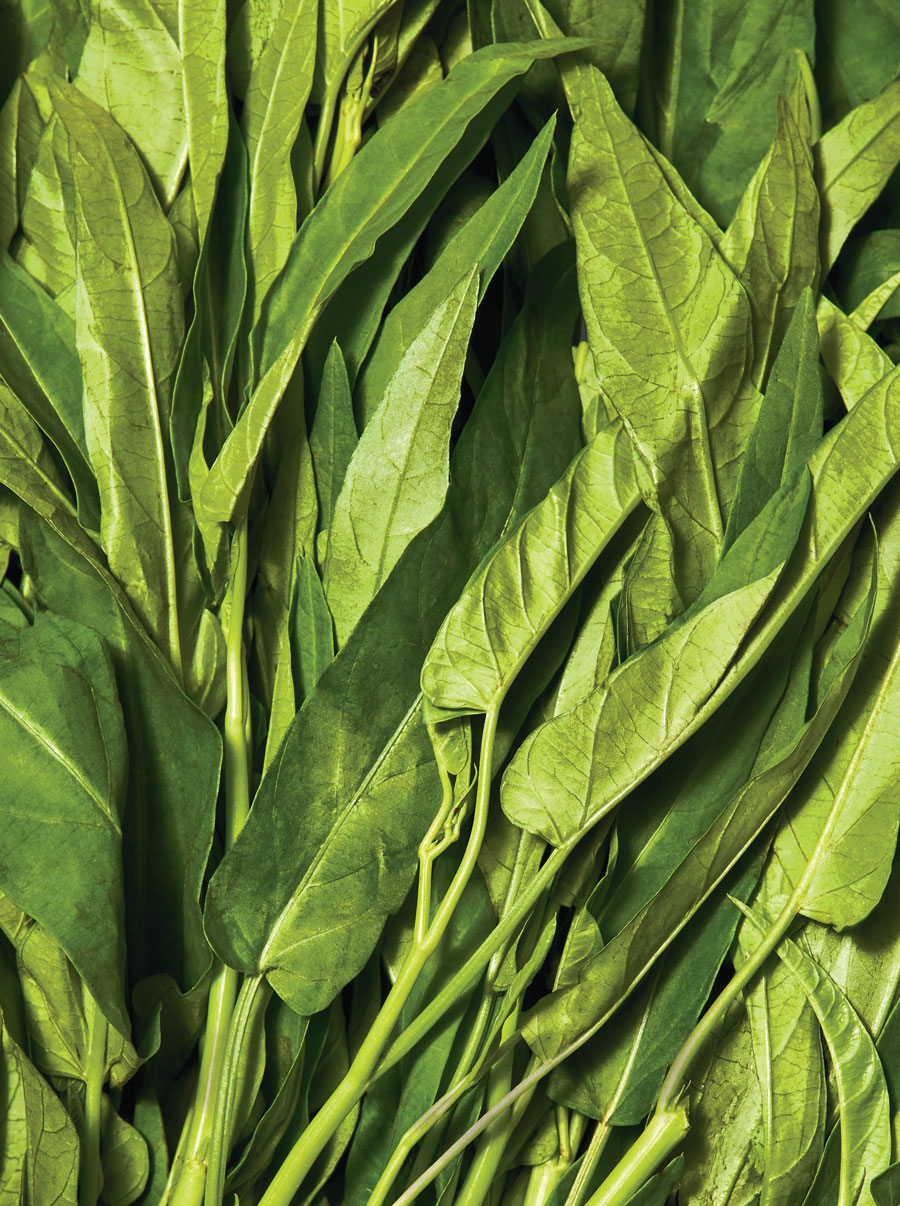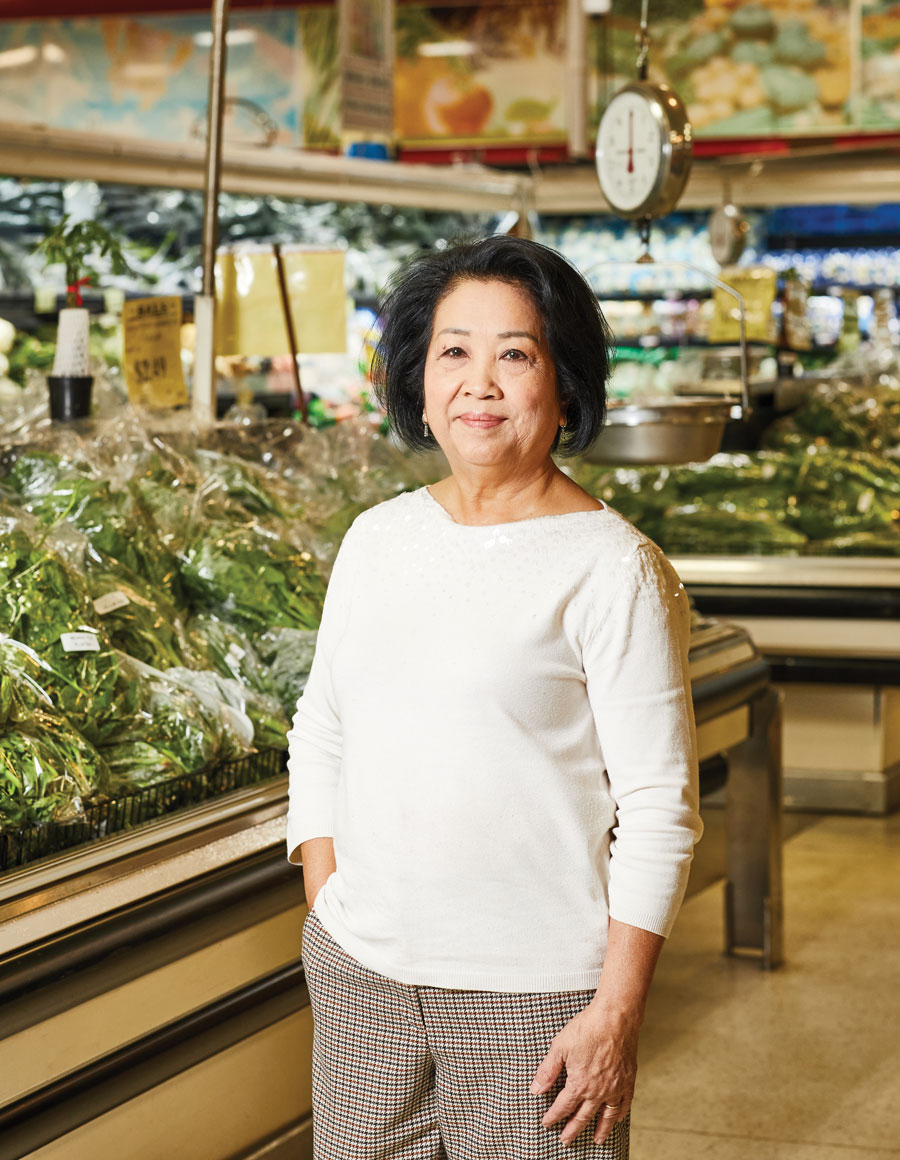
Photograph by Bailey Garrot
When Le Dam Doan moved to Lawrenceville in 2004, she was surprised to learn that one of her cooking staples was not just unavailable but illegal: They’re treating water spinach like marijuana, she thought.
In the 33 years Doan and her husband spent in California and Maryland, they’d never lived anywhere they couldn’t legally buy rau muống, aka water spinach. The prohibition in Georgia was more surprising because Doan—now a member of the Asian Pacific American Council of Georgia and the Vietnamese-American Community of Georgia—had been drawn to her new neighborhood, in part, by its established Vietnamese community. In Vietnam, Cambodia, China, Indonesia, Malaysia, Thailand, and the Philippines, the crop’s mild, tender leaves and stems—which thrive in rivers and damp soil—are sauteed by the pound. Water spinach is often stir-fried with garlic, ginger, fermented tofu, or, as seen in the Malaysian dish kangkung belacan, shrimp paste.
In Georgia, though, it had been illegal for a decade over fears that, as a non-native species, the aquatic vine could overtake the state’s waterways, to the detriment of native species. (Not even herbicides can stop water spinach from growing four inches a day in Florida, where it’s cultivated in closely regulated nurseries—but sometimes escapes.) Last year, after pushback from residents, the state finally lifted its import and sales ban so restaurants and grocers can sell the vegetable, but officials are still exploring whether and how Georgia might become the fifth state in the U.S. to allow its cultivation. The move reflects a continuing conversation, among biologists, lawmakers, and immigrant advocates, over whether plants not native to Georgia can have their place in the state.
Previously, if locals weren’t growing water spinach illicitly, they were bringing it over from Florida and Texas—like how Georgians once had to cross the state border into South Carolina to buy fireworks. People sold water spinach in grocery store parking lots, out of their cars, and door-to-door at nail salons, churches, and temples. Costs could run up to three times the vegetable’s typical price on this black market, at $11 a pound, says Jenny Vo, chief operating officer at Atlanta-based City Farmers Market and Hong Kong Supermarket. “When you went to restaurants, you had to be so secretive about it: Do you guys carry it? Do you have it? It’s a whole ordeal just to get a vegetable.”
More than a decade ago, Hong Kong Supermarket started collecting signatures online and on clipboards at every register to petition for the legalization of water spinach. The petitions often cited national developments that owner Ben Vo watched closely, like how in Rosharon, Texas, water spinach was actually found to be a low-risk crop, given the proper regulations.

Photograph by Bailey Garrot
In 2016, after chatting with community members like Vo, Doan, and Alfred Yin (the late president of Georgia’s Organization of Chinese Americans), state Rep. Pedro Marin introduced a bill that would exempt water spinach from Georgia’s definition of a “plant pest”—an organism that “may be injurious to the agricultural, horticultural, or other interests of the state”—so it could be cultivated. His bill was rejected. Marin explained the Department of Agriculture’s concern: “Even if you grow it at home, the fear was, where are you going to dump that water? That water might have something that goes into the waterways. All of a sudden, we would have a water spinach crisis on our hands.”
When biologists debate the importance of native plants, it’s typically as part of a larger conservation effort, to protect an environment that risks being damaged. But critics wonder whether such harsh lines need to be drawn, as introducing a new species to an environment isn’t always harmful. As America’s population diversifies, so might its attitude toward plants like water spinach and water dropwort. The latter is on the invasive species lists in Wisconsin, New Jersey, and New Hampshire. It’s also the titular inspiration behind the 2020 Oscar-winning film Minari, the plant being symbolic of how its Korean immigrant protagonists will one day persevere in their new home of rural Arkansas.
In Georgia, water spinach became a priority again with the 2021 election of state Rep. Marvin Lim, who represents unincorporated Norcross—and who spotted the crops growing when he visited the village where his mother grew up in the Philippines last summer. He studied and chatted with experts from Florida and Texas, learning how those states cultivate the crop without causing environmental harm. (The answer: greenhouses and careful regulation.) Meanwhile, Doan and others collected over 100,000 signatures in favor of legalization. Community members handed out flyers at a campaign event for house Rep. Bee Nguyen and organized an informational event for then agriculture commissioner Gary Black to stress how integral water spinach is to their lives.
Black landed on a solution: not a bill, as Marin proposed in 2016, but a legislative bypass. In 2022, Black notified the USDA on a change in the Georgia Department of Agriculture’s stance, and the state began approving import and sales permits so that, per the announcement, “Georgia’s restaurants will now be able to offer this ingredient in their menu offerings.” Demand was so high at their stores that Ben Vo instructed Jenny, his daughter, to pay their Texas vendor early to guarantee a steady supply.

Photograph by Bailey Garrot
Previously, the Georgia Department of Agriculture estimated that Georgia-grown water spinach could be available as soon as this year. But the department, now led by Commissioner Tyler Harper, is still evaluating the rules and regulations that would need to be followed for cultivation. For now, Doan says that grocers only sell water spinach tops, with most of the plant’s hollow stems cut off, so that the plant doesn’t accidentally propagate: “They cut the root very deep so they don’t have the root when we take it home.”
Residents have been grateful for the progress made thus far. “There was one event where I was winning an award, and I was gifted water spinach,” Lim says. Customers still call Jenny Vo “Ms. Rau Muống” for how she used to stand by registers, pleading for their signatures in support. Water spinach is now part of regular grocery hauls, selling for a more reasonable $3 a pound. “People don’t think twice about buying it,” Vo says. “You just have to have it every week.”
This article appears in our April 2023 issue.













